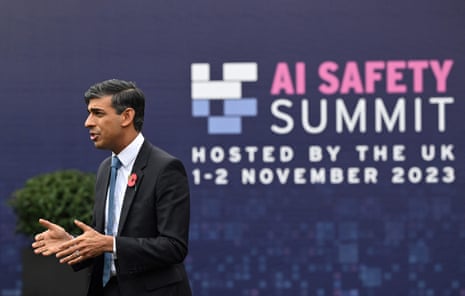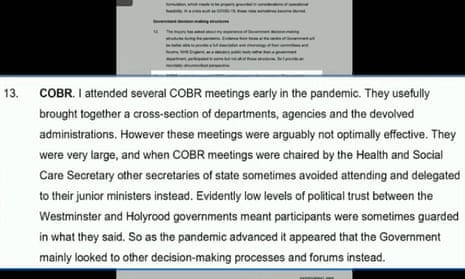
Sunak says people should not be ‘alarmist’ about risk posed by AI – while saying it could be as dangerous as nuclear war
Rishi Sunak told reporters at the AI safety summit this morning that people should not be “alarmist” about AI – even though he also said the technology could be as dangerous as a pandemic, or nuclear war.
Asked whether a Terminator-style rise of the machines was possible, he replied:
People developing this technology themselves have raised the risk that AI may pose and it’s important to not be alarmist about this. There’s debate about this topic. People in the industry themselves don’t agree and we can’t be certain.
But there is a case to believe that it may pose a risk on a scale like pandemics and nuclear war, and that’s why, as leaders, we have a responsibility to act to take the steps to protect people, and that’s exactly what we’re doing.
Last week the government published three papers assessing the risks posed by AI.

Key events
Stevens says Cobra meetings on Covid were not ‘optimally effective’
Q: What role did you play in core political decision making?
Stevens says his priority was to ensure that the NHS could look after Covid patients, and other patients it needed to see too.
He says NHS England was not directly involved in debates such as whether there was a need for lockdowns.
He says he attended some of the Cobra emergency committee meetings dealing with Covid. But he says that over time the government stopped using Cobra to deal with Covid matters.
Q: You says in your statement these meetings were not “optimally effective”. What do you mean?
Stevens says the meetings were very large, which did not help. And sometimes ministers there did not have full authority.
Q: You say when Matt Hancock was chairing them, sometimes other departments sent junior ministers.
Stevens says is not saying that was cause and effect.
Q: That is what you imply.
Stevens says he is just saying what he observed.
Q: Would more senior ministers have attended if the PM had been chairing those meetings?
Stevens says, if Boris Johnson had been chairing the meeting, other secretaries of state might have attended. But he says he is not sure that would have made a big difference to the substance of what was decided.

At the Covid inquiry Simon Stevens is giving evidence now.
Andrew O’Connor KC, counsel for the inquiry, is questioning him.
They begin with an explanation of NHS England, and how it is not under the direct control of the Department of Health and Social Security. O’Connor says Matt Hancock was not officially Stevens’ boss. Stevens says it often felt that he had many bosses.
Labour councillors say they’re visiting Westminster today hoping to force meeting with Starmer’s office

Sammy Gecsoyler
A delegation of current and recently resigned Labour councillors, including the former and acting Oxford CLP chair, are to visit Westminster this afternoon to force a meeting with Keir Starmer’s office.
The delegation will be welcomed by John McDonnell. Caroline Raine, the acting chair of the Oxford and District Labour party, is heading the delegation. Raine became chair after the former post holder, Jabu Nala-Hartley, quit the party, citing Starmer’s “refusal to condemn collective punishment of Palestinians”.
Nala-Hartley was one of the nine Oxford councillors who resigned from the party last month which led to Labour losing control of the council. Nala-Hartley is among the delegation in Westminster today, which is made up of a group of about 10 councillors and party activists.
Raine wrote to Starmer’s office yesterday. She said:
I would like to again emphasise that we have made arrangements to come to Westminster tomorrow afternoon. We expect to be seen by someone from LOTO [the leader of the opposition’s office] between 2.30 and 4pm please. We gave notice in good time and it would be very poor practice in a crisis like this for us to be sent away without being heard.
She said that the delegation includes Jews, Muslims, Christians and those of no religious faith and added “the purpose of our delegation is to stress to the leadership that we uphold a universal aspiration for human rights, due process, freedom of speech and thought, dignity and equality.”
In a statement, the delegation say they “want to put the case for an immediate ceasefire” to Starmer. They say:
We want an Israel where Israelis and Palestinians can live in peace and liberty. By agreeing that the war against Hamas can continue after a humanitarian pause, the Labour party is colluding in the endorsement of war crimes and of breaches of international law.
Former NHS England chief executive Simon Stevens to give evidence to Covid inquiry
Simon Stevens, the former NHS England chief executive, is about to give evidence to the Covid inquiry.
The hearings on Monday, Tuesday and Wednesday this week have all been embarrassing for Boris Johnson, but they have also been bad for the reputation of Matt Hancock, health secretary during Covid. Dominic Cummings and Helen MacNamara did not agree on much, but they both accused Hancock of misleading colleagues about what the Department of Health was actually doing about the threat posed by the virus (see here and here).
Stevens, and Sir Chris Wormald, permanent secretary at the Department of Health and Social Care, who is up later this morning, are both likely to be asked about these claims.
Sunak says people should not be ‘alarmist’ about risk posed by AI – while saying it could be as dangerous as nuclear war
Rishi Sunak told reporters at the AI safety summit this morning that people should not be “alarmist” about AI – even though he also said the technology could be as dangerous as a pandemic, or nuclear war.
Asked whether a Terminator-style rise of the machines was possible, he replied:
People developing this technology themselves have raised the risk that AI may pose and it’s important to not be alarmist about this. There’s debate about this topic. People in the industry themselves don’t agree and we can’t be certain.
But there is a case to believe that it may pose a risk on a scale like pandemics and nuclear war, and that’s why, as leaders, we have a responsibility to act to take the steps to protect people, and that’s exactly what we’re doing.
Last week the government published three papers assessing the risks posed by AI.

Labour says it would ‘urgently’ impose new rules on firms working on frontier AI, in challenge to Rishi Sunak
Good morning. This afternoon Rishi Sunak will be wrapping up the AI safety summit at Bletchley Park with a press conference. The summit has already produced the Bletchley declaration. But, with the government saying it will not “rush to regulate”, the event is not producing domestic UK law. Labour has spotted an opportunity and this morning it is saying that it would “urgently” impose new regulations on companies involved in so-called frontier AI (the most advanced type).
Peter Kyle, the shadow science secretary, said:
AI has the potential to transform the world and deliver life-changing benefits for working people. From delivering earlier cancer diagnosis, to relieving traffic congestion, AI can be a force for good.
But to secure these benefits we must get on top of the risks and build public trust. It is not good enough for our ‘inaction man’ prime minister to say he will not rush to take action, having told the public that there are national security risks which could end our way of life. The AI summit was an opportunity for the UK to lead the global debate on how we regulate this powerful new technology for good. Instead the prime minister has been left behind by US and EU who are moving ahead with real safeguards on the technology.
In a statement announcing its plan, Labour says:
A Labour government would urgently introduce binding regulation of those companies developing the most powerful ‘frontier’ AI . This would include requirements to:
• Report before they train models over a certain capability threshold.
• Conduct safety testing and evaluation on these models, with independent oversight
• Maintain strong information security protections, to limit the unintended spread of dangerous models
We will hear more on that this afternoon. First, this morning, the two most powerful officials in the NHS when coronavirus struck will give evidence to the Covid inquiry.
Here is the agenda for the day.
10am: Simon Stevens, the former NHS England chief executive, gives evidence to the Covid inquiry. Later in the morning Sir Chris Wormald, permanent secretary at the Department of Health and Social Care, gives evidence.
10am: Sir Mark Rowley, Metropolitan police commissioner, and Sadiq Khan, mayor of London, are questioned by the London assembly.
Noon: Humza Yousaf, Scotland’s first minister, takes questions from MSPs.
2pm: Prof Yvonne Doyle, former medical director for Public Health England, gives evidence to the Covid inquiry.
Around 4pm: Rishi Sunak is due to chair a press conference at the end of the AI safety summit at Bletchley Park.
If you want to contact me, do try the “send us a message” feature. You’ll see it just below the byline – on the left of the screen, if you are reading on a laptop or a desktop. This is for people who want to message me directly. I find it very useful when people message to point out errors (even typos – no mistake is too small to correct). Often I find your questions very interesting, too. I can’t promise to reply to them all, but I will try to reply to as many as I can, either in the comments below the line; privately (if you leave an email address and that seems more appropriate); or in the main blog, if I think it is a topic of wide interest.


